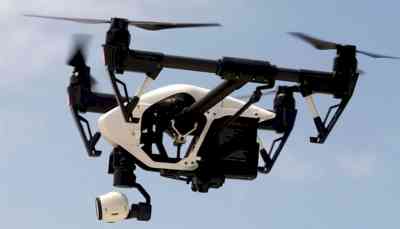Pakistan's use of China-made drones to pump arms, drugs to terror groups in Punjab on rise
Raids carried out by the National Investigation Agency (NIA) at 10 places in Punjab on Wednesday have confirmed further that gangsters turned terrorists operating from Pakistan are making increased use of China-made drones to send arms, ammunition and drugs across the border into Punjab.

RAJINDER S TAGGAR
Chandigarh, Nov 30: Raids carried out by the National Investigation Agency (NIA) at 10 places in Punjab on Wednesday have confirmed further that gangsters turned terrorists operating from Pakistan are making increased use of China-made drones to send arms, ammunition and drugs across the border into Punjab.
The NIA raided the residences of gangster-linked suspects in the border districts of Fazilka and Tarn Taran among other places which showed that they were engaged in retrieving drugs and arms that were supplied through through drones.
Most of these drones are made in China. They are difficult to detect as they fly sub-radar, are small in size and have a low sound, a counter-intelligence wing officer said.
Drones are the preferred mode for cross-border delivery of consignments by ISI and Pak-based militant groups. Around 200 drone activities were noticed this year at various points along the border, according to data from the Punjab police's intelligence wing.
In the Amritsar sector, the BSF on Wednesday night foiled a drug smuggling attempt from across the International Border by shooting down a drone that had entered the Indian territory, leading to the seizure of 3.1 kg of narcotics. Another smuggling bid was attempted in the Tarn Taran sector during the same period, again with the help of a drone.
The Punjab Police in a joint operation with the BSF seized five AK-47 rifles, five pistols, and nine magazines from Ferozepur this week, DGP Gaurav Yadav said.
Airdropping of drugs, arms, and ammunition by drones continues unabated even as many consignments have been seized. The drone activity to carry out narcotics and arms smuggling was first noticed in 2019.
The Border Security Force, which is guarding the 553 km stretch of border with Pakistan, this year shot down 13 drones besides thwarting the intrusion of many unmanned aerial vehicles, the officials said.
One drone was shot down near the Shahpur border outpost in Amritsar on October 14, and two were gunned down on October 16 and 17 in the Amritsar sector.
The officials said smugglers backed by Pakistan's spy agency ISI use sophisticated and high-end Chinese drones, with minimum sound and capable of flying at a higher level.
A drone shot down on October 14 was a quadcopter (DJI Matrice) with a holding and releasing mechanism. The drone activities have been concentrated mainly in areas along the international border in Amritsar, Gurdaspur, Ferozpur and Tarn Taran districts, officials said.
The Punjab Police and the BSF coordinate in busting gangs involved in the smuggling of narcotics and weapons from across the border.
Last month, the BSF decided to shoot Indian smugglers who come to collect narcotics and weapons, dropped by drones from Pakistan, near the international border. This policy is acting as a major deterrent.
"If a smuggler comes to receive the consignment, the law permits the security agencies to fire at the smuggler," said an official.
The BSF has decided to reward its personnel who gun down a drone sneaking into Indian territory.
According to a note prepared by the Punjab police, only five drones were shot down in the three-year period between 2019-2021, but this year, more than 15 drones have been shot in 11 months.
A large number of drones returned without dropping payload when confronted by BSF men, the note said. In November, two drones were shot down in Gurdaspur and Amritsar districts.
The drone, recovered by the BSF, with two packets of heroin weighing around 1.6 kg, was sent to a special instrument workshop in New Delhi for examination. Its logs revealed that it had made 36 flights.
The drone manufactured by Da-Jiang Innovations, Shenzhen, China, could take off with a 9 kg weight with a maximum flight time of 31 minutes. Its maximum speed was found to be 82.8 km/per hour. "Payload drop system was attached to the drone, and the system was capable of dropping payload on receiving a signal," the analysis revealed.
Since 2019, Punjab Police have busted 24 terror modules resulting in the recovery of a huge number of terror-related hardware, narcotics, and foreign currency.
What has increased worries of the Punjab police is that consignments of ammunition dropped from drones are reaching gangsters and militants.
The drugs are pushed from across the border to the conduits of Khalistani terrorists in India, who then provided money to some modules in Punjab to perform secessionist tasks.
Police have a strong lead that ammunition and arms used in the RPG attack on Punjab Police's intelligence headquarters were pushed by the Khalistanis operating from within Pakistan.
(The content is being carried under an arrangement with indianarrative.com)
--indianarrative



 IANS
IANS 










